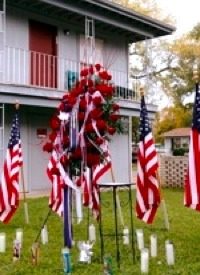
While completing his residency at Walter Reed Army Medical Center, Major Nidal Hasan told an audience of fellow physicians that the army should excuse Muslim soldiers from serving in combat zones where they would be fighting others of their faith. If Muslims in the U.S. Armed Forces were not thus afforded conscientious objector status, then there could be “adverse effects,” Hasan warned.
In the Summer of 2007, Hasan, who is accused of murdering 13 people at Fort Hood on November 5, and his fellow residents were assigned by their superiors at Walter Reed to prepare a presentation on any topic of medical relevance. They were then to present their work to a group of senior psychiatrists as part of their final student evaluation.
When Major Hasan stepped to the podium to address 30 or so medical professionals in attendance, instead of confining himself to the assigned topic, he spent over an hour lecturing and showing over 50 slides on suicide bombers, general principles of Islam, and the potential harm that the army could expect from Muslim soldiers torn by conflicting loyalties to God and country. “It’s getting harder and harder for Muslims in the service to morally justify being in a military that seems constantly engaged against fellow Muslims,” Hasan told the undoubtedly perplexed crowd.
In fact, according to interviews conducted by the Washington Post with attendees of the presentation, the senior staff members listening to Hasan were angry and confused. Other students who gave presentations had no difficulty in conforming with their superiors’ guidelines and accordingly spoke on germane subjects such as new drugs and treatment techniques.
Asked about the details of the story by reporters, a spokesman for Walter Reed Army Medical Center declined to comment and army officials claimed they knew nothing of the events. Army officials would not say whether Hasan had formally requested resignation from the Army or not to be deployed to the Middle East with his unit.
Hasan’s presentation, which he entitled, “The Koranic World View As It Relates to Muslims in the U.S. Military,” ended with a final slide that read: “We love death more then [sic] you love life!”
In other related news, Anwar Al-Awlaki, the radical American-born imam who fled to Yemen after three of his congregants participated in the terrorist attacks on September 11, 2001, told investigators that even though he maintained an email correspondence with Major Hasan, he neither ordered nor encouraged Hasan to kill Americans. Hasan came to revere Al-Awlaki, who was the prayer leader at the Dar al-Hijra mosque in Virginia, as a trusted spiritual advisor.
While the controversial cleric, who after the November 5 massacre called Hasan a “hero,” has refused to speak to American reporters, he did reveal to a Yemeni journalist a few telling details of his relationship over the past year with Nidal Hasan. The reporter, Abdulelah Hider Shaea, was permitted by Al-Awlaki to review email exchanges between him and Hasan.
Asked by Shaea why he called Hasan, an accused murderer, a “hero,” the former imam responded, “I blessed the act because it was against a military target. And the soldiers who were killed were not normal soldiers, but those who were trained and prepared to go to Afghanistan and Iraq.”
Incendiary statements of this hue and the fact that he was the spiritual leader of three September 11 hijackers has earned Al-Awlaki the distinction of being regarded by the intelligence community as one of al-Qaeda’s chief English-speaking supporters.
Proof of Al-Awlaki’s advocacy of al-Qaeda’s murderous aims in furtherance of a jihad against the West and America specifically are not difficult to discover. Al-Awlaki has openly and consistently heaped strident praise on terrorists and the atrocities committed by them all around the globe. Most notably, Al-Awlaki posted a congratulatory message to Somali extremist group al-Shabaab after it successfully deployed a U.S. citizen as a suicide bomber. He quite earnestly and reprehensibly mused, “They say American soldiers in Iraq and Afghanistan should be killed, so how can they say the American soldier should not be killed at the moment they are going to Iraq and Afghanistan?”
After word broke of Al-Awlaki’s ties to Hasan, Al-Awlaki wrote on his website that “fighting against the U.S. Army is an Islamic duty” and that the only way a Muslim could justify serving in the American armed forces is if he did so only in order to “follow the footsteps of men like Nidal [Hasan].”
Shaea reportedly read the relevant email messages and claims that Hasan initiated contact with Al-Awlaki in December 2008. According to Shaea’s report, Hasan sent the imam two or three messages thanking Al-Awlaki for helping him more closely embrace Islam. As to the precise content of the emails exchanged between Al-Awlaki and Hasan, Shaea would not comment. He did, however, give American reporters the following admonition couched in a woeful ignorance of historical chronology, “There are some people in the United States who said this shooting has nothing to do with Islam. That it was not permissible under Islam. But I would say it is permissible.… America was the one who first brought the battle to Muslim countries.” Whether permissible under Islam or not, the murder of 13 innocent men and women is not permissible under the laws of Texas and the United States and Major Nidal Hasan will now be held accountable for his actions before a military tribunal and may face execution.
Photo: AP Images



